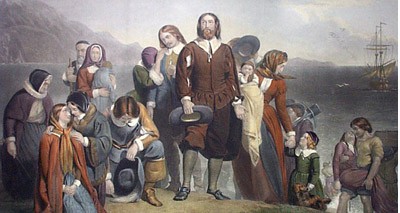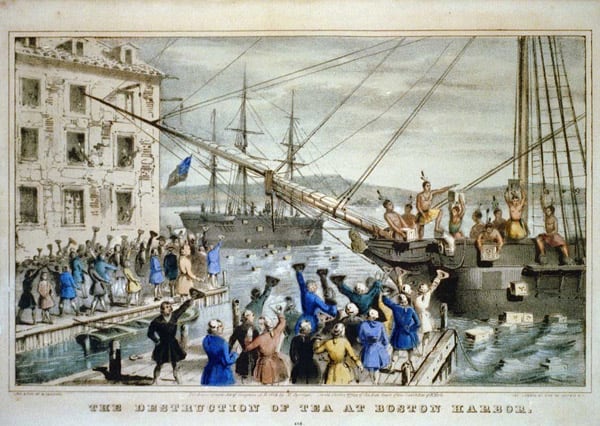America Is Not a “Proposition Nation”
Charles Tallis, American Renaissance, June 2, 2017

When I was studying French in school we used an elementary reader that was published in France ages ago. On one page it had the pictures of the peoples of different nations with their corresponding names in French. These pictures were stereotypes — French, German, English, American, African, Chinese, Egyptian, etc. — of the demographic reality that existed. Those people were their nations, and needless to say, each person representing a European country was white.
What is a nation? It is not defined by political boundaries but by its people. The Oxford Dictionaries define a nation as “a large aggregate of people united by common descent, history, culture, or language, inhabiting a particular country or territory.”
Merriam-Webster’s etymology emphasizes birth or common descent: “Middle English nacioun, from Anglo-French naciun, from Latin nation-, natio birth, race, nation, from nasci to be born; akin to Latin gignere to beget.”
What makes a nation “propositional”? Here are standard definitions for “proposition:” “Something offered for consideration or acceptance.” “A theorem or problem to be demonstrated or performed.”
It is hardly encouraging to think of one’s nation as “something offered for consideration” or “a theorem or problem.” As a practical matter, the contemporary meaning would be a nation defined by ideology or legal doctrine, rather than by race, ancestry, religion, and culture. A “proposition nation” therefore has none of the elements that traditionally are required for a people to be considered a nation, so the term is a contradiction.
What attracts people to the idea of a propositional nation? Its rejection of the true meaning of nation: common blood, common descent, common culture. Whites — but only whites — believe that rejecting these things is enlightened, progressive, and virtuous. This is because they think a national sense of blood and soil leads to war and Nazism, so eliminating traditional nations is the only way to prevent war and atrocities. Again, this applies only to whites.
There have been other “proposition nations” before anyone referred to the United States as one. Communist countries were supposed to put class solidarity above nation, but never really succeeded. When the Soviet Union was in a death struggle with Germany, Stalin put aside Marxist doctrine and called on all Russians to join in what he called “The Great Patriotic War.” It was a war for Russia, not for Marxism.
What could be called the first “propositional nation” was founded with no expectation that the “proposition” would appeal to non-Europeans. The French Revolution produced the Declaration of the Rights of Man and of the Citizen, along with the famous motto, Liberté, égalité, fraternité. These were promoted as universal values, but this did not stop Charles De Gaulle, a century and a half later, from pointing out that the French “are after all and above all, a European people of the white race, with a Greek and Latin culture and the Christian religion.”

Declaration of the Rights of Man and of the Citizen
France continues to make a pretense of ignoring race and ethnicity, but this concept of domestic universalism was challenged with the arrival of non-European immigrants after the Second World War. Before then, immigrants had been mainly European, and assimilated well. Immigrants from the Middle East and Africa have been much slower to assimilate, have high levels of social pathologies, and some have committed barbaric acts of terrorism.
No “proposition” can hold together a nation with stark racial, ethnic, cultural, or religious differences. Such diverse nations are kept together with constant propaganda, ethnic bribery, coercion, and even force. This is true not just of the United States but of Malaysia, Lebanon, and the former Yugoslavia, Sudan, and Soviet Union.
It is common to suggest that the United States was founded explicitly as a proposition nation, but this is false. What lead to the Revolution were such issues as representation, voting, taxation, tariffs, etc. Americans were primarily from the British Isles, with a smattering of other European nationalities, and there was never any question that the United States was still tied to Great Britain.

The Declaration and Resolves of the First Continental Congress of October 14, 1774 had many references to the colonists’ rights as Englishmen: [O]ur ancestors, who first settled these colonies, were at the time of their emigration from the mother country, entitled to all the rights, liberties, and immunities of free and natural-born subjects, within the realm of England.” The Declaration of Independence refers several times to our “British brethren.”
Those who want to rewrite American history love to trot out Thomas Jefferson’s phrase, “all men are created equal,” while completely ignoring the purpose of the Declaration: It is a detailed list of 28 grievances that justify separation from Britain. In this context, “all men are created equal” asserts that the colonists are equal to the British Crown and have the right to sever ties. Indeed, in his “The Declaration of Independence in American,” H.L. Mencken rewrites the famous phrase as: “First, me and you is as good as anybody else, and maybe a damn sight better.” Jefferson and the signers are announcing that they are dealing with the king as equals, not suggesting that all human beings are biologically equal.

Jefferson Memorial (Credit Image: © Image Source/ZUMAPRESS.com)
As has been often pointed out, the Declaration itself does not treat American Indians as equals: “He [the king] has excited domestic insurrections amongst us, and has endeavored to bring on the inhabitants of our frontiers, the merciless Indian Savages whose known rule of warfare, is an undistinguished destruction of all ages, sexes and conditions.”
It is also well known that the United States Naturalization Law of 1790 passed by the very first Congress was explicit in its inegalitarian conception of American citizenship, which it limited to “free white persons of good character.” Indians, white indentured servants, slaves, free blacks, and later Asians were all excluded.
In 1787, in the second of The Federalist Papers, John Jay gave thanks that “Providence has been pleased to give this one connected country to one united people, a people descended from the same ancestors, speaking the same language, professing the same religion, attached to the same principles of government, very similar in their manners and customs . . . .” This is not a celebration of a proposition nation but of a traditional nation based on common blood.
The idea of America as a proposition is promoted by revisionists who pervert the history of the Founding Fathers. Nine of the first 11 presidents were slave-holders, and contemporary views of racial equality did not take root until well into the 20th century.
If the United States was a proposition nation, the proposition did not exactly hold it together. Civil war broke out just 71 years after the meeting of the first Congress, with the latest estimates of combatant casualties as high as 750,000.
Many conservative whites have a foolish, “propositional” view of the United States. They believe the Constitution, rightly construed, will save them from tyranny and keep us from drifting away from Western principles. It is certainly true that the words of the Constitution have been twisted; they now mean whatever the justices say they do. But it is a delusion to think that an originalist Supreme Court would make much difference. The Constitution, even if interpreted as originally conceived, cannot bind together a multi-racial nation, nor can it protect whites if they become a minority.
The leftist interpretation of the proposition nation is nothing more than a justification for multiculturalism and mass immigration. Anyone, regardless of origins and orientation, is an American simply by crossing the border. This has the effect of replacing whites — who are the only conservative voting bloc — with people who will vote for the Left.
Hillary Clinton believes in the proposition:
American was an invention . . . . It was an intellectual invention, and we have done pretty well for all these years. And these people [who think America is a distinct people] want to just undermine that very profound sense of who we are.
For Mrs. Clinton, “that very profound sense of who we are” is a profound sense that anyone can be us, which is another way of saying we are nothing at all.
Some of the most extreme advocates for a propositional United States are “neoconservatives,” who distrust any form of European ethnonationalism and welcome mass immigration. Robert Kagan downplays the English origins of the founding documents and gives them a false universalism:
What are the sources of its [America’s] enduring power? One source is the American commitment to universal principles embedded in the nation’s founding documents . . . .
To all the founders, the United States was a “Hercules in a cradle,” powerful in a traditional sense and also in a special, moral sense, because its beliefs, which liberated human potential and made possible a transcendent greatness, would capture the imagination and the following of all humanity. These beliefs, enshrined in the Declaration of Independence, were neither exclusively Anglo-Saxon nor Burkean accretions of the centuries . . . .
It is absurd to claim that the founders established the country for “all humanity.”
Clearly, only white nations are ever called propositions. No one would say this about Japan or Pakistan. The United States, Canada, Australia, and New Zealand are special targets for being called propositions because they were settled through immigration, but even continental European countries now talk about their commitments to “diversity” and to “European values” that now require open borders for non-Europeans.
The proposition in this sense is not universal but applies only to whites, and undermines their claims on their own nations. And we can be sure that once whites are sufficiently reduced in numbers and power the charade of the proposition will be discarded. The newly dominant groups will engage in their own ethnocentric struggles for power — the “proposition” be damned — and the remaining whites are likely to live in a state of dhimmitude or persecution.
We are the only people who can be tricked into suicide of this kind. Belief in the proposition is self-inflicted genocide. The “proposition” nation is a fraud; we must remain dominant in our ancestral lands.















